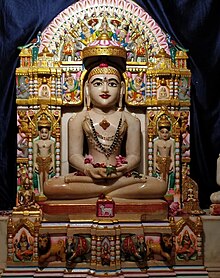Kunthunatha
| Kunthunatha | |
|---|---|
 The idol of Kunthunatha Bhagwan at a Jinalaya in Raipur, Chattisgarh | |
| Venerated in | Jainism |
| Predecessor | Shantinatha |
| Successor | Aranatha |
| Symbol | Goat[1] |
| Height | 35 bows (105 metres) |
| Age | over 95,000 years |
| Color | Golden |
| Genealogy | |
| Born | |
| Died | |
| Parents |
|
| Dynasty | Ikshvaku dynasty |
| Part of a series on |
| Jainism |
|---|
 |
Kunthunath was the seventeenth Tirthankara, sixth Chakravartin[3] and twelfth Kamadeva of the present half time cycle, Avasarpini.[1][4] According to Jain beliefs, he became a siddha, liberated soul which has destroyed all of its karma. Kunthunatha was born to King Surya (Sura)[1] and Queen Shridevi at Hastinapur[3] in the Ikshvaku dynasty on the fourteenth day of the Vaishakh Krishna month of the Indian calendar.[4]
Etymology
Kunthu means heap of Jewels.[3]
Life
According to the Jain belief, he was born in 27,695,000 BC, Like all other Chakravartin, he also conquered all the lands[3] and went to write his name on the foothills of mountains. Seeing the names of other Chakravartin already there, he saw his ambitions dwarfed. He then renounced his throne and became an ascetic for penance.[3] At an age of 95,000 years he liberated his soul and attained Moksha on Mount Shikharji.[3]
Famous Temple
- Prachin Bada Mandir, Hastinapur, Uttar Pradesh
- Ganigitti Jain temple, Hampi
- Kunthunath Temple at Jaisalmer Fort in Jaisalmer, Rajasthan
-
Chaubisi of Kunthunatha,Chaubisi of Kunthunatha at National Museum, New Delhi, 15th century
-
Prachin Bada Mandir, Hastinapur
-
Kunthunath Temple, Madhuban
See also
References
- ^ Jump up to: a b c Forlong 1897, p. 14.
- ^ Tandon 2002, p. 45.
- ^ Jump up to: a b c d e f von Glasenapp 1999, p. 308.
- ^ Jump up to: a b Tukol 1980, p. 31.
Sources
- Johnson, Helen M. (1931), Kunthusvsmicaritra (Book 6.1 of the Trishashti Shalaka Purusha Caritra), Baroda Oriental Institute
- von Glasenapp, Helmuth (1 January 1999), Jainism: An Indian Religion of Salvation, Delhi: Motilal Banarsidass, ISBN 81-208-1376-6
- Tukol, T.K. (1980), Compendium of Jainism, Dharwad: University of Karnataka
- Forlong, Major-General J.G.R. (1897), Short Studies in the Science of Comparative Religions, 15 Piccadilly, London: B. Quaritch,
Not in Copyright
{{citation}}: CS1 maint: location (link) - Tandon, Om Prakash (2002) [1968], Jaina Shrines in India (1 ed.), New Delhi: Publications Division, Ministry of Information and Broadcasting, Government of India, ISBN 81-230-1013-3



